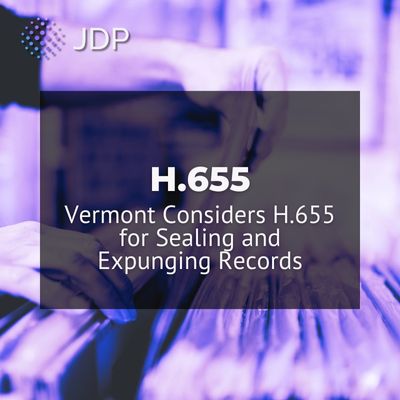April 11, 2024
Vermont legislators have returned to discuss reforming the state’s existing expungement system. They will also discuss expanding the ability for residents to seal old criminal records. However, this attempt closely resembles a similar measure that Governor Phill Scott vetoed almost two years ago.
Vermont currently offers two methods for individuals to limit or remove access to their criminal records: expungement and sealing. Expunging records effectively eliminates the recorded criminal history, making it appear like it never happened. Sealing removes the record from public access, though certain agencies can still access it when permitted. During a House judiciary committee meeting, legislative counsel Michele Childs referred to criminal history as “all information documenting an individual’s contact with the criminal justice system.”
This new legislation (H.655) expands the list of offenses qualifying for sealing upon petition. It would also shift certain expungeable offenses to sealable. H.655 would also update who can access sealed criminal records and under what circumstances. Under H.655, the current dual process would change almost entirely to sealing criminal records, with few records qualifying for expungement.
The previous bill, H.534, which Governor Scott vetoed, would have expanded the number of offenses qualifying for expungement. Governor Scott explained that he rejected the bill due to several concerns. For example, he worried about expanding eligibility for sealing drug offenses as violent crimes associated with drugs spiked. Finally, Governor Scott commented that it contradicted legislation related to gun safety and the expansion of background checks.
H.655 attempts to follow up on a compromise suggested by the governor to resolve these concerns. Governor Scott announced,
“To address these concerns, my administration proposed a uniform, simplified system of sealing – rather than erasing – criminal records. This approach would eliminate undue consequences related to housing, job, and education for those Vermonters who are not repeat offenders while also ensuring access for law enforcement and criminal justice purposes as well as for background checks necessary to ensure public safety and security.”
Because expungement makes it as if the records never existed, agencies, landlords, and employers will find it challenging to access expunged convictions. Expunging these records can also pose challenges for law enforcement and government agencies. Though sealed records remain, accessing them has proven difficult. As such, certain circumstances may allow interested parties to access the information. Accessing these records requires specific purposes, such as government-performed background checks.
Though the House has already approved H.655, it still awaits review from the Senate. Its future proves further uncertain, as it also needs the governor’s signature.
Disclaimer:
Information provided here is for educational and informational purposes only and should not constitute as legal advice. We recommend you contact your own legal counsel for any questions regarding your specific practices and compliance with applicable laws.
